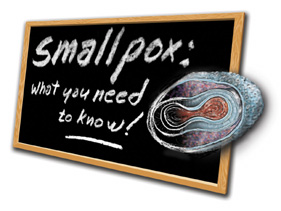 UNMC invites Nebraskans to attend a free health educational series on smallpox, titled, “Smallpox: What You Need to Know,” on Thursdays, Feb. 13, 20 and 27, from 6:30 to 8:30 p.m. (CST). During the series, Nebraskans will learn about smallpox, the social and ethical issues, the risks involved in the smallpox vaccine, the safety mechanisms in medical research and how the state will respond in the event of a bioterrorist attack.
UNMC invites Nebraskans to attend a free health educational series on smallpox, titled, “Smallpox: What You Need to Know,” on Thursdays, Feb. 13, 20 and 27, from 6:30 to 8:30 p.m. (CST). During the series, Nebraskans will learn about smallpox, the social and ethical issues, the risks involved in the smallpox vaccine, the safety mechanisms in medical research and how the state will respond in the event of a bioterrorist attack.
The goal of Mini-Medical School is to educate Nebraskans on health issues that affect them, as well as highlight the strides being made in research and treatment at UNMC. The free series will be broadcast live via satellite from Omaha to: Columbus, Grand Island, Kearney, Lincoln, Norfolk, O’Neill, Red Cloud and Scottsbluff. Continuing education credits for nurses also are available.
Anyone with satellite downlink capability can receive the series by accessing Nebraska Satellite System 2, (NebSat2) channel 107.
Three sessions
On Feb, 13, during “Smallpox 101,” speakers will discuss viruses and vaccines and the history, treatment and prevention of smallpox. On Feb. 20, “Research: Risks, Rights and Responsibilities,” speakers will address the risks and benefits of the smallpox vaccine and safety mechanisms in medical research. On Feb. 27, “Securing Nebraska’s Homeland” speakers will discuss how Nebraska plans to protect the citizens of Nebraska against the threat of a bioterrorism attack.
Registration, continuing education credits
Participants will have the opportunity to ask questions of presenters. Seating is limited. Registration is required. For more information about the series go to www.unmc.edu/smallpox.
While the program is free to the public, Nebraska and Iowa nurses who wish to receive six contact hours of continuing nursing education credits can do so at a cost of $30 through the UNMC College of Nursing.
To get technical information about accessing NebSat2 satellite downlink, call Brenda Jeter at (402) 559-9049 or bjeter@unmc.edu.
More on smallpox
Smallpox is a contagious, and sometimes fatal disease caused by the variola virus. Fever and a progressive skin rash are symptoms. Smallpox first emerged in human populations thousands of years ago. In 1980, the disease was declared eradicated following worldwide vaccination programs. Routine smallpox vaccinations in the United States ended in 1972.
Two known samples of smallpox were kept in secure laboratories in the United States and the Soviet Union. With the political upheaval that dismantled the former Soviet Union and its secret bioweapons program, some people fear that terrorists or rogue nations could create weapons of mass destruction using smallpox.
After the terrorist and anthrax attacks in the fall of 2001, the U.S. government began making plans to respond to a potential attack.
A detailed nationwide smallpox response plan is designed to vaccinate people quickly and contain a potential outbreak, including a plan includes the creation of healthcare teams who have been vaccinated and are ready to respond. Public and private institutions are working together to implement Nebraska’s response plan.
UNMC Mini-Medical School dates, topics and presenters:
Thursday, Feb. 13 — 6:30 to 8:30 p.m. (CST)
“Smallpox 101” –
 |  |
Hinrichs | Romero |
Learn the basics of viruses, vaccines and the immune system. Find out how the vaccine was developed from cowpox, why people who were immunized at one time would need to be revaccinated, and what are the potential side effects. “Intro to Virology 101” will be presented by Steven Hinrichs, M.D., director, Center for Biosecurity, University of Nebraska, director, Nebraska Public Health Laboratory, medical director, Clinical Microbiology, Professor, UNMC Department of Pathology and Microbiology; “Understanding Vaccines” will be presented by Jose Romero, M.D., associate professor, pediatrics and pathology/microbiology, joint appointments at UNMC and Creighton University, chief Latino recruitment officer for UNMC;
 |  |
Smith | Crouse |
Thursday, Feb. 20 — 6:30 to 8:30 p.m. (CST)
“Research: Risks, Rights and Responsibilities” —
 |  |
Prentice | Kelso |
 |  |
Rupp | Schonfeld |
Thursday, Feb. 27 — 6:30 to 8:30 p.m. (CST)
“Securing Nebraska’s Homeland” —
 |  |
Lenaghan | Pour |
 |  |
Raymond | Heineman |